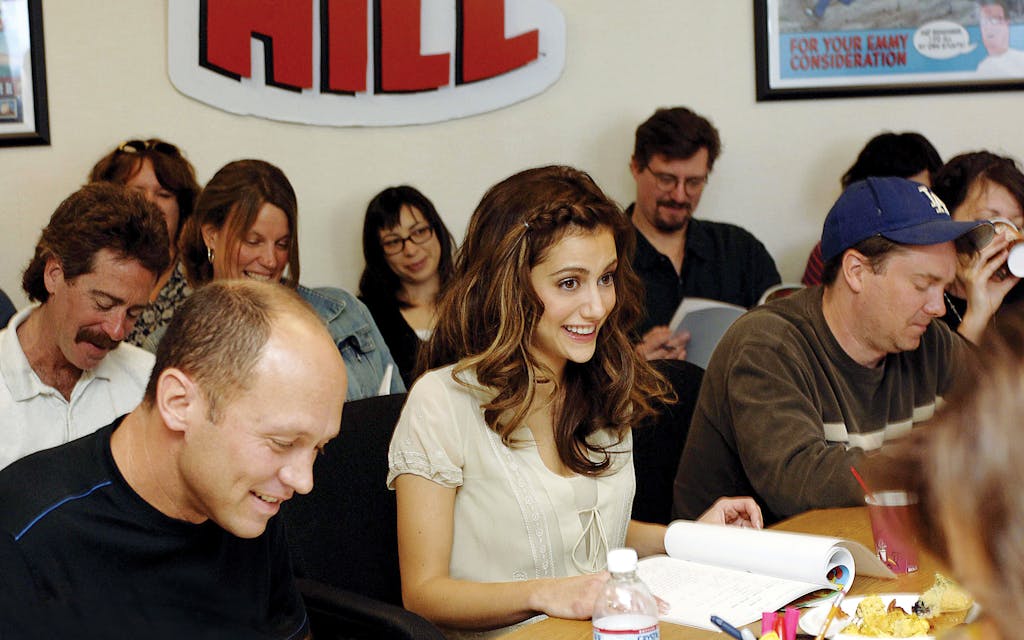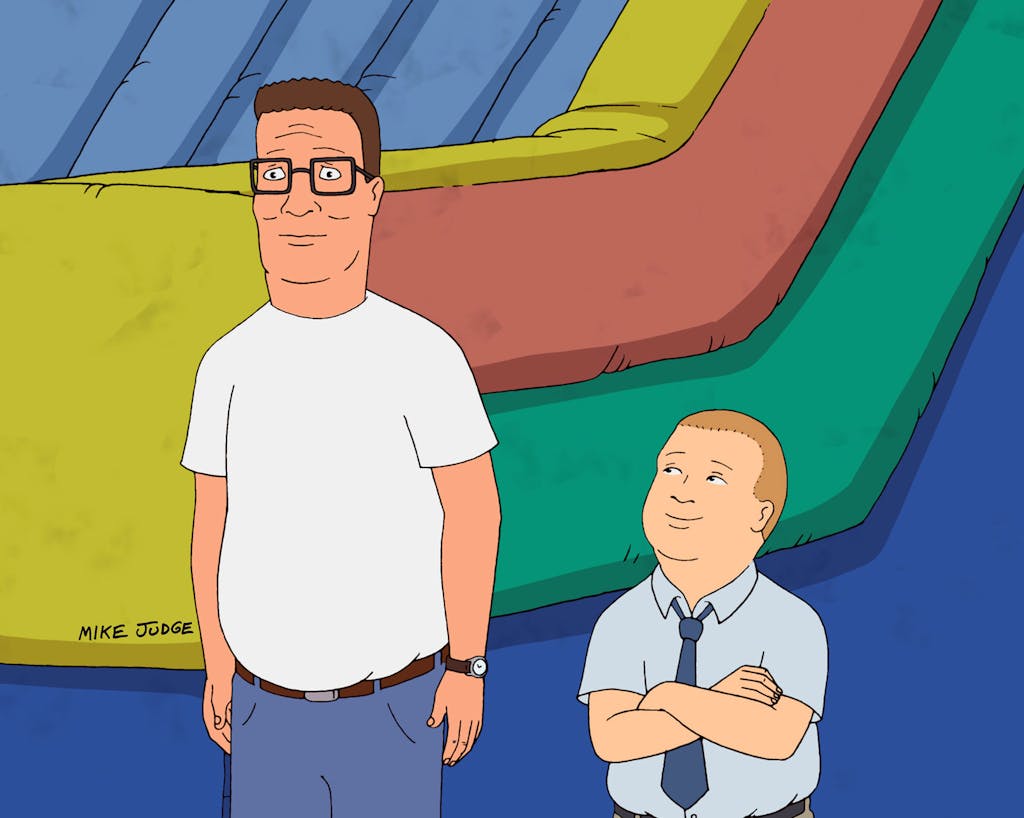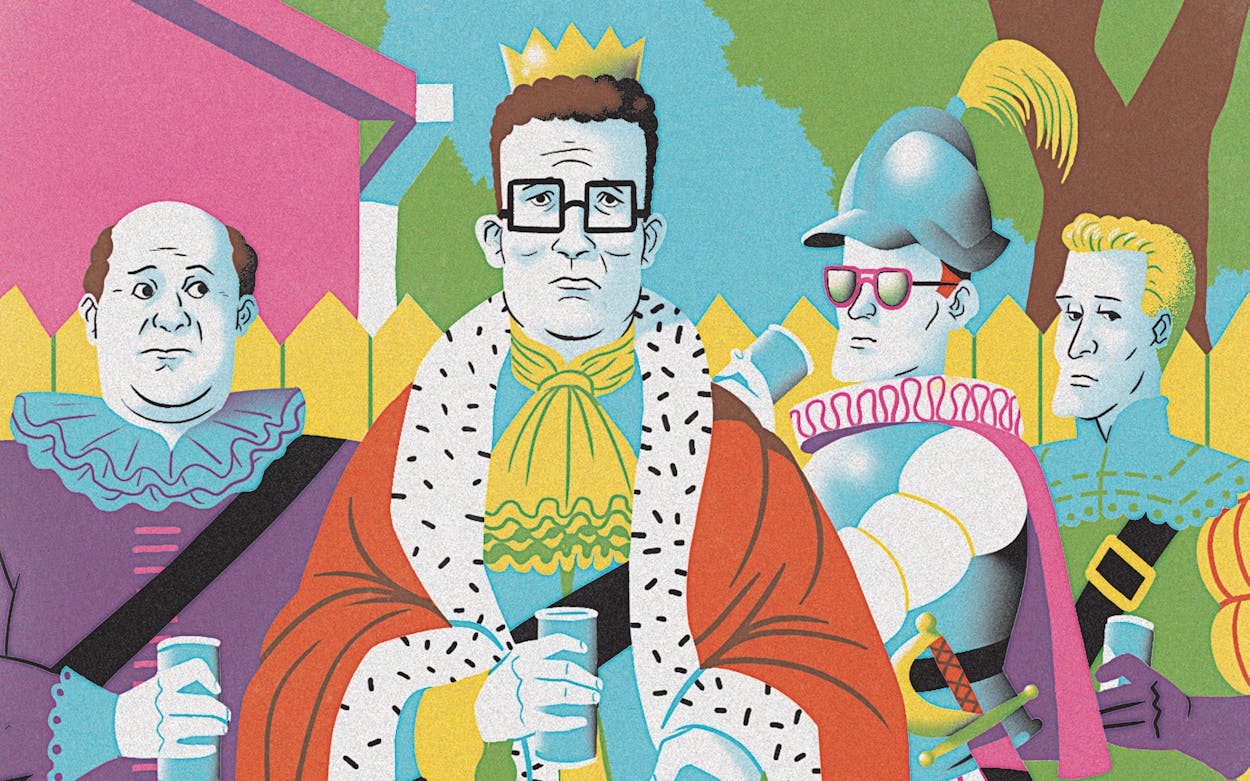The January 12, 1997, premiere of King of the Hill opened on a tableau that would soon become iconic. Hank Hill, noble purveyor of “propane and propane accessories” for the fictional Texas suburb of Arlen, gathers around his beloved truck with his neighbors and buddies: paranoid, chain-smoking Dale Gribble, cheerily depressed divorcé Bill Dauterive, and mushmouth lady-killer Boomhauer. The men stand in contented silence, trading a few potent “yeps,” just whittling away the time.
As they crack open a fresh round of beers, Dale asks whether anyone caught last night’s episode of Seinfeld. You expect them to scoff. What could guys like these see in a show like that? But it turns out they’re all big fans.
“Them dang ol’ New York boys,” Boomhauer chuckles, just before the opening credits roll. “Just a show about nothin’.”
King of the Hill was also “a show about nothin’ ”—about going to work, hanging out with your buddies, navigating the minutiae and petty grievances of modern life. But of course, as on Seinfeld, nothing is always something. Like Jerry Seinfeld, Hank Hill is a character with deeply held convictions about how things are supposed to be. Your wife isn’t supposed to see you on the toilet. Boys are supposed to play football, not soccer. People in general aren’t supposed to be selfish or illogical or uninhibited. Whenever one of these moral certainties is tested, Hank lets loose a “Bwah!” that sounds like his inner gears are grinding against the world.
Across its thirteen-season run, King of the Hill didn’t quite achieve Seinfeld’s cachet, nor was it a tectonic phenomenon like The Simpsons and South Park. Yet it’s endured over the past quarter century, still enjoyed by loyal fans from dang ol’ New York all the way to Japan, where Hank’s “Bwah!” is overdubbed with a far less distinctive “Ehhhh?” That’s because anyone can relate to all that nothing—the feeling that everything’s always changing and that our principles are constantly being challenged by charlatans, jerks, and hypocrites. The show may be set in Texas—its cocreator, Austin resident Mike Judge, based Arlen specifically on his years in Richardson and Garland—but these characters feel like they could live next door to anyone.
The show’s setting alone made King of the Hill groundbreaking. Before Judge’s cartoon, Texans on TV were, ironically, far more two-dimensional: the scheming oilmen of Dallas or the kick-first-ask-questions-later lawman of Walker, Texas Ranger. Whatever soulful complexities we were granted in films like Tender Mercies or The Last Picture Show were all but lost on the small screen. Hank Hill himself comes face-to-face with those clichés in a season two episode, when he’s saddled with an obnoxious client from Boston who insists on calling him “J.R.” and demands to know why he doesn’t wear cowboy boots. “Texas has changed a lot since the 1850s,” an exasperated Hank tries explaining. But given the way pop culture had treated us, you can’t really blame the guy for his ignorance.

Judge had already broadened depictions of Texans with his first animated hit, Beavis and Butt-Head, which first aired in 1993. As he did on King of the Hill, Judge drew from his time living in North Texas to create the show’s fictitious-yet-familiar suburb, a place where strip malls and big-box stores are plopped into vast expanses of flat, undeveloped land. But Beavis and Butt-Head are only nominally Texans. They listen to heavy metal and watch too much TV, like the kids in any American town. They’re citizens of basic cable, the spread of which was rapidly eroding any sense of regional identity. With King of the Hill, Judge made that subtext into text: Arlen was rapidly diversifying, thanks to that same cultural flattening. Faced with a rising tide of yuppies and yoga studios, Hank fights to hold on to his ideals about what it means to be a Texan like he’s trying to keep the pests out of his precious yard.
The initial reviews of King of the Hill, including one in Variety, declared that the show must be poking fun at small-town America with its “fundamental redneck humor.” But Hank Hill isn’t Larry the Cable Guy or some chicken-fried Archie Bunker. In fact, Hank hates being called a “redneck” more than he hates anything (with the possible exception of charcoal). He may have a few archaic ideas about gender roles, and—at least at first—he shows some regrettably xenophobic attitudes toward his new Laotian neighbor, Kahn. But ultimately, Hank judges people not by the color of their skin but by the quality of their character. He quickly comes to respect Kahn when he sees that he’s also a good, stern father. And Hank’s sexism is rooted in a misguided sense of tradition, not misogyny. Hank deeply admires his wife and self-proclaimed best friend, Peggy, cheering on her substitute teaching career and her many side hustles. And he safeguards his niece Luanne against skeevy guys who don’t truly value her, nurturing her talents and self-reliance (if only to get her to move out of his den). “Women were not put on earth to serve [men],” Hank tells his twelve-year-old son, Bobby, early in the show’s run.
Notably, although King of the Hill mocks Hank for his prejudices and for generally being uptight, it also admires his integrity. He’s an eminently decent man who believes in honesty and hard work, and he’s pitted against a world that increasingly doesn’t. Hank’s antagonists all tend to be lazy or manipulative; often they’re meddlesome busybodies, mucking up everything with their rules. Series cocreator Greg Daniels instructed the writers to read Philip K. Howard’s 1994 treatise The Death of Common Sense to help them understand Hank’s worldview, which is largely that the nanny-state bureaucracy has unnecessarily complicated things, leaving us all feckless and fearful. Hank Hill is common sense incarnate. When he threatens to kick someone’s ass, the show tends to agree that they probably deserve it.


However, Hank isn’t always right, and his willingness to admit that is what makes him a far more complex—and enduring—creation than so many other old-fashioned TV dads. Most King of the Hill episodes culminate with some sort of compromise, usually via a heart-to-heart talk where Hank realizes that how things are supposed to be just isn’t the way they are. Nowhere is Hank’s ability to adapt more evident than in his relationship with Bobby. Hank’s son is sweet and funny, charming and unusually confident. But he’s not the kind of traditionally masculine Texas boy that Hank imagined himself having. Bobby’s a bit lazy, and he doesn’t care about football or cars; his life’s dream is to move to New York and become a famous prop comic. “That boy ain’t right,” Hank worries, so he constantly tries to “fix” Bobby by taking him to Longhorns games and teaching him how to repair a carburetor.
Theirs is a classic generational conflict, but King of the Hill doesn’t fall prey to stereotypes here, either. Instead, the show complicates its father-son dynamic by including Hank’s own cantankerous cuss of a dad, Cotton. Hank starts out worshipping Cotton, laughing off his dad’s loud-and-proud racism and sexism as the harmless bluster of a “flamboyant character,” the kind of Texan that TV traditionally loves. Yet as soon as Hank witnesses Cotton’s toxic influence on Bobby, he decides he doesn’t want his son turning into some “woman-hating old fool.” Nor does he want to be the kind of father that Cotton had been to him: undermining, belittling, focused only on himself. Instead, Hank resolves to connect with Bobby, even if it means accepting that his son’s values sometimes differ from his own.
“I am not some redneck, and I’m not some Hollywood jerk,” Hank declares in a season nine episode. “I’m something else entirely. I’m . . . I’m complicated!” He might have been speaking for an entire swath of Southerners who felt similarly mocked, misunderstood, or caught between reductive extremes. While some regarded King of the Hill as a satire that lampooned hillbillies and liberals equally, the show was always simpler and—yes—more complicated than that. It’s about ordinary people in their everyday complexities; it showed the rest of the world that Arlen, Texas, wasn’t so different from anywhere else. And it gave Texans a model for how we, too, could evolve alongside our own rapidly changing state without fundamentally changing ourselves.
“I think people who analyze shows like this probably tend to put too much of politics on it,” Mike Judge told NPR’s Terry Gross in 2009. Judge has always insisted that King of the Hill isn’t a political show—that it was, in fact, about people who had things to do and didn’t “wake up and think about politics all day.” Nevertheless, parsing the show’s politics has remained a favorite pastime. It should come as no surprise, for example, that the internet has spent time debating whether Hank Hill would have voted for Donald Trump.
After all, Hank is a God-and-Ronald Reagan-worshipping Republican. National Review once crowed that “King of the Hill Showed That Conservatism Can Thrive on Prime Time,” lauding the way it made punch lines out of welfare sponges, smug hippies, and coastal elites. But on the other hand—and although he would hate to hear it—Hank could also be downright progressive. He’s a conservationist who believes in climate change. He’s a proud gun owner, but he warns Bobby that guns are dangerous. Hank’s a devout Christian who dislikes evangelicals, Christian rock, and megachurches, and he’s a free-market capitalist who hates the mom-and-pop-destroying Mega Lo Mart. The man’s personal hero is Willie Nelson, for crying out loud. Like he says, he’s complicated.
Hank is the kind of hardworking, flyover-country everyman that candidates on both sides love to invoke. The fact that his loyalties can’t be so easily pigeonholed has long made him an appealing political litmus test. Could Hank have been swayed by Trump’s reactionary brand of conservatism? Would he have been able to square his friendship with his Mexican American employee Enrique—or with Enrique’s daughter, Inez, who asks Hank to speak at her quinceañera—with voting for a man who had tarred Mexican immigrants as criminals and rapists? Could Hank really overlook Trump’s climate change skepticism, his bullying and vulgarity, or his New Yorker imperiousness? Hank detests Bill Clinton, so we know he’d never have voted for Hillary. But faced with such a difficult choice, perhaps Hank might have been driven to write in Tom Landry. Surely he’d have drawn the line at Trump’s zeal for well-done steak.

But this debate isn’t really about Trump, per se. It’s about whether people like Hank Hill can still exist in such a polarized and unreasonable era, when it seems like we can’t help but wake up and think about politics all day. There are still plenty of traditionalists in Texas longing for the way things are supposed to be, “Bwah!”-ing against the dying of the light. In Texas, there are even more liberals and [shudder] Californians gentrifying our suburbs and turning farmland into CBD stores than there were in the show’s heyday. Yet there seem to be fewer and fewer people, on both sides, who share Hank’s interest in peaceful compromise—in not letting politics get in the way of being neighborly.
Last March, it was reported that Judge and Daniels were in “hot negotiations” to revive King of the Hill at Fox, a continuation that would find the characters fifteen years older, living in a Texas that has only become more diverse—and divided. As of press time, those plans have not yet come to pass, but you can see why there would be some renewed interest in the show (and not just to see Hank square off against a thinly veiled Elon Musk). Texas has never felt more like a microcosm of America than it does right now, locked in battle between progressivism and conservatism, between rural values and urban modernity. A series like King of the Hill could be uniquely positioned to show everyone a more reasonable, more compassionate middle ground, and maybe even help us find our way back. Mister, we could use a man like Hank Hill again, I tell you what.
This article originally appeared in the January 2022 issue of Texas Monthly with the headline “Watch the Throne.” Subscribe today.
- More About:
- Film & TV
- Television
- Mike Judge







